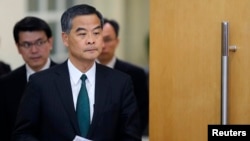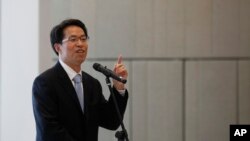Nearly one year after pro-democracy protests riled Hong Kong’s politics, the territory’s top official is coming under criticism for suggesting that his position “transcends” the other branches of government.
Hong Kong chief executive Leung Chun-ying’s remarks this week endorsed the views of a top Beijing official who said that the chief executive was in a “special legal status which transcends the territory’s executive, legislative and judiciary branches.”
Zhang Xiaoming, director of the Liaison Office of the Central People’s Government in Hong Kong, also denied that Hong Kong’s system endorses the separation of executive, legislative and judicial powers, saying such concept applies to sovereign states, not Hong Kong.
Zhang’s comments immediately triggered an uproar in the former British colony a little more than a week before the anniversary of last year's massive Occupy Central protests that saw thousands turn out in the streets for weeks protesting Beijing’s plan for electing Hong Kong's next chief executive.
Deep divide
The election decision, which said only Beijing-approved candidates could participate, and limited the field to three candidates, was taken as the latest sign of eroding freedoms in the former British colony.
When Hong Kong was returned to China from the British in 1987 it was guaranteed freedoms that do not exist in mainland China under what is called the "one country two systems" model. Key parts of these differences include Hong Kong’s freewheeling capitalistic market system and freedom of the press and speech.
The comments made by both Leung and Zhang highlight the deep divide that exists between those that feel the central government in Beijing should determine how Hong Kong's democracy develops and those who feel it is a matter for the port city's citizens to decide.
They also highlight differences over basic ideas such as the rule of law.
Albert Ho, a member of Hong Kong's Legislative Council says few Hong Kongers see eye to eye with Leung and Zhang.
“Everybody should be equal before the law. Obviously he [Leung] should be subject to the Basic Law and to the laws in Hong Kong. So, I think what he [Zhang] said is really nonsense,” said Ho.
In a rebuke to the chief executive, the city’s Chief Justice Geoffrey Ma also took a strong stance to emphasize that the city has long ensured equality before law.
“Judicial independence, this is specified in the Basic Law in three separate places. And I would ask people to read article 2, 19 and 85,” Ma told reporters this week.
Article 2 stipulates that the legislature in Beijing authorizes the city “to exercise a high degree of autonomy and enjoy executive, legislative and independent judicial power, including that of final adjudication.”
Article 19 states that the city shall be “vested with independent judicial power,” while Article 85 say the courts in Hong Kong “shall exercise judicial power independently, free from any interference.”
Sinking popularity
Critics say Zhang’s controversial remarks reflect Beijing’s long-held views, and came at a time when chief executive Leung’s popularity was at a new low.
“Beijing would like to rescue his [Leung’s] plunging authority in the remaining two years of his term, in particular, when Beijing sees the danger of the further plunging of his popularity given the possible, imminent economic trouble ahead of Hong Kong,” said Dixon Sing, associate professor of the Hong Kong University of Science and Technology's social science division.
Though Leung may not be Beijing’s choice for running in the city’s next chief executive election in 2017, Sing said authorities in China cannot allow his credibility to further weaken because it will undermine the central government’s control.
The professor said Zhang’s comments, apparently aimed at boosting the chief executive, have backfired as they pose a threat to the city’s legal cornerstone.













